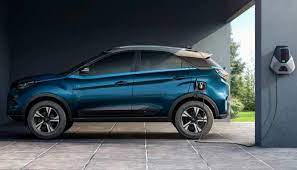Electric vehicles are the future of mobility. As governments gradually phase out gasoline engines, auto-makers must create viable, practical and desirable replacements.
While Tesla has a significant lead in the market compared to other automakers, many are playing catch-up. Legacy manufacturers like Nissan, Ford and Porsche now offer exciting new EVs, and new companies like Lucid and Rivian are also coming up with solid competitors.
So, for the year 2022, which EV models can we expect to be launched?
1. GMC Hummer EV3x Pickup
The vehicle is the mid-level pickup version of the much-anticipated GMC Hummer EV. While the top-end Edition 1 already launched and sold for $112,000 last year, this more affordable version will allow more buyers to get their hands on the much-acclaimed EV.
What makes this vehicle exciting are the features users expect to find. Firstly, this pickup is powered by three motors in an all-wheel-drive configuration. With over 800 hp, it helps accelerate the truck to 100 mph in about 3 seconds. Buyers also get the Crab Walk feature, which lets it walk diagonally or diagonally.
The GMC Hummer EV3x is the successor to the Hummer series of pickup trucks. While older trucks were often ridiculed for their inefficiency, massive size and less than stellar build quality, the new Hummer EV line aims to cash in on the name by providing luxury, zero-emissions vehicles.
2. BMW i4
The BMW i4 is the electrified version of the much talked about BMW 3 Series. It comes in two models—the standard eDrive40, which has a rear-wheel-drive, 335 hp motor and a 301-mile range; and the M-Series counterpart the M50, which has an all-wheel-drive, 536 hp dual motor setup with 270 miles of range.
Many BMW fans who are also into electric vehicles will love this offering from Munich, especially considering that it is based on one of their most popular models. The car also has many of the features you can find on the latest models of the M3 and M4, so those who already own these models will feel right at home.
What’s more, the base model eDrive40 isn’t too far off the price of the top-end M340i, while the M50 is more affordable than the M3. Given the range, power and price details of the BMW i4, they are a good match for BMW owners looking to make the transition to electric power.
3. Ford F-150 Lightning
The Ford F-150 has been America’s best-selling car for over thirty years. So it makes sense for them to offer it as an electrified version. After all, if they can sell more than 600,000 F-150 trucks in 2021, perhaps they can transfer some of that success to the Lightning model.
Although the top version is significantly more expensive than the Platinum Limited, about $15,000 more, just $2,000 more than the base-model Pro XL. This makes the entry-level electric version a compelling option for professionals and workers alike.
After all, not only do they save fuel, but they also get extra storage in the trunk. However, it has a standard range of only 230 miles, which is shorter than the estimated 416 miles you get from the gasoline-powered version. You can opt for the Extended Range option, which gives you 300 miles of range, but it adds a substantial amount to the sticker price and isn’t available in the base model.
Still, if you typically use the truck to travel within the city and find yourself at home every night, range won’t be an issue. After all, most people buy pickup trucks primarily for hauling, which is all that extra funk space will give you. So expect the Ford F-150 Lightning to be a hit like its gasoline-powered brethren.
4. Toyota bZ4X
Toyota created the world’s first mass-produced hybrid vehicle in 1997 with the Toyota Prius. However, they still haven’t made a fully electric car after more than twenty years. But that will change this year with the release of the bZ4X.
The crossover is set for a summer release, with options for single-motor front-wheel-drive or dual-motor all-wheel-drive versions. While it has an expected range of 250 miles, it doesn’t offer the sub-three-second 0 to 60 mph acceleration of other EVs. Instead, owners will get a more leisurely 8.4 second 0 to 60 rating.
While some will say that there is nothing exciting in Toyota’s new offering, they may be more interested in it because of Toyota’s stellar reputation in reliability.
The company claims their battery will maintain 90% charge capacity for up to 10 years, and there could also be optional rooftop solar panels to help recharge the vehicle when parked. Those who have been thinking about buying an EV because of battery life and reliability concerns can finally get one with the bZ4X. After all, it is Toyota.

